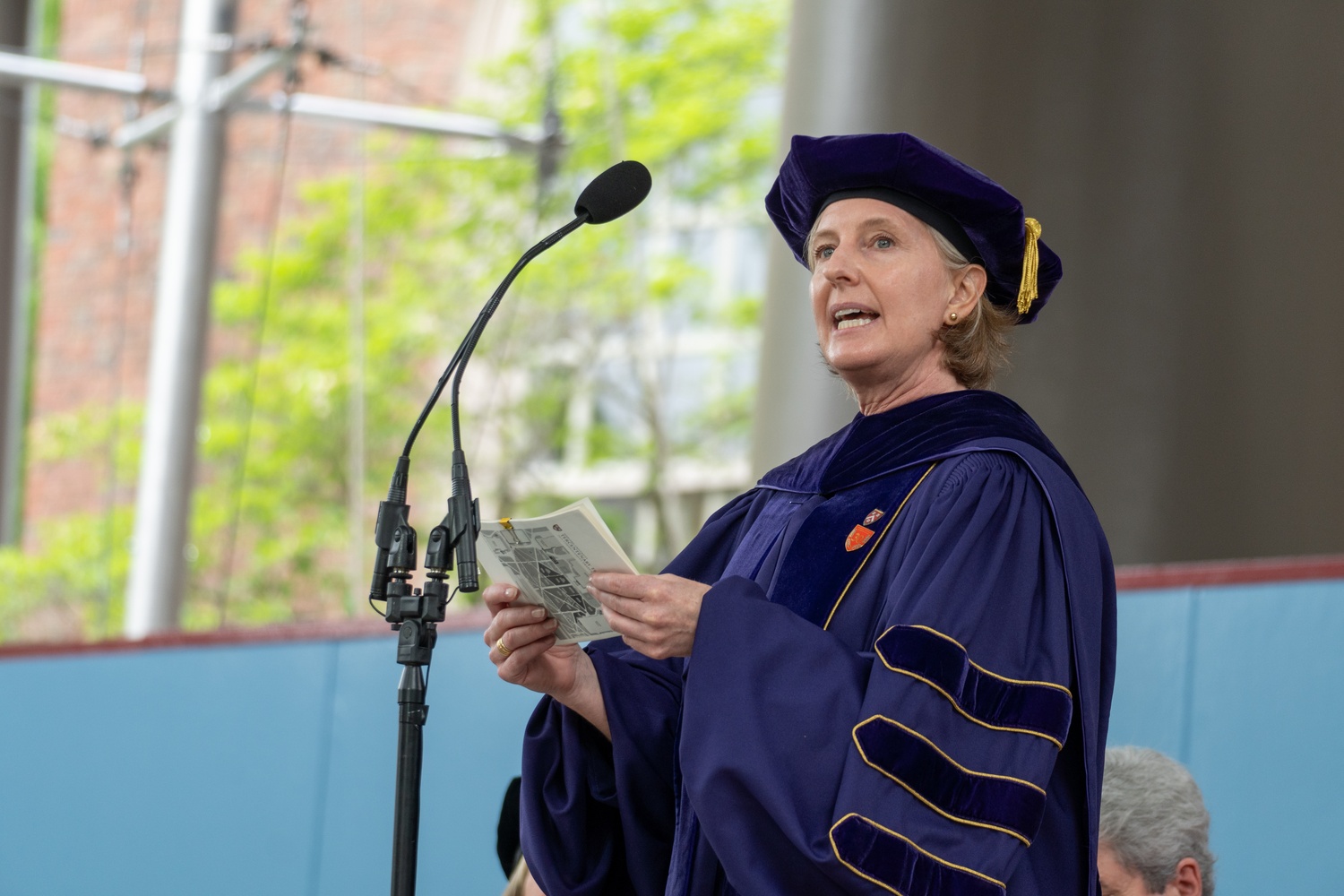
News
Summers Will Not Finish Semester of Teaching as Harvard Investigates Epstein Ties

News
Harvard College Students Report Favoring Divestment from Israel in HUA Survey

News
‘He Should Resign’: Harvard Undergrads Take Hard Line Against Summers Over Epstein Scandal

News
Harvard To Launch New Investigation Into Epstein’s Ties to Summers, Other University Affiliates

News
Harvard Students To Vote on Divestment From Israel in Inaugural HUA Election Survey
Harvard FAS Announces New Funding Program for Research Impacted by Trump Cuts

Harvard Faculty of Arts and Sciences Dean Hopi E. Hoekstra announced a new program to fund senior and tenure-track FAS professors whose grants have been terminated by the Trump administration in a Friday message.
The initiative, called the Research Continuity Funding program, will begin funding 80 percent of the operating expenses previously covered by terminated grants once faculty have exhausted their alternative funding to 10 percent of their initial value. The program will last through June 30, 2026, at which point the FAS will evaluate whether to extend it for another year.
“Over the next year, we must adapt to a new world where our sources of research funding will need to change, but our commitments to academic excellence and high-impact scientific discovery will not,” Hoekstra wrote in the message.
FAS spokesperson James M. Chisholm stressed that the new funding program — recommended to Hoekstra by the recently established Research Continuity Committee — was not a long-term solution, writing in a statement that the “FAS does not have the financial resources to cover all federally funded research indefinitely.”
The new program draws from “substantial” FAS funds, as well as the $250 million funding pool announced by University President Alan M. Garber ’76 announced Wednesday for supporting research affected by the Trump administration’s freeze on nearly $3 billion in federal funding.
Following Garber’s Wednesday announcement, the University issued guidance on the new funding, instructing private investigators to pause capital purchases, limit non-personnel spending, and pause any new hiring funded through affected grants.
And in a Thursday email, Harvard School of Public Health Dean Andrea A. Baccarelli praised the new funding pool as “critical” to work at HSPH, which has been the most impacted by the funding cuts out of all the University’s schools. But Baccarelli also echoed Chisholm’s warning that the pool is not a long-term fix.
“The funding from the University cannot be used to maintain the status quo, because our partnership with the federal government—a partnership that has been foundational to our research mission for eight decades—has shifted dramatically,” Baccarelli wrote.
In her email, Hoekstra wrote that the FAS would fund research activities backed by terminated grants through June 30, but reiterated the University-wide guidance to hold back on large purchases and new hires and said that primary investigators should draw primarily from external sources starting July 1. Once their funding dries up, she wrote, they could then turn to RCC funding.
Hoekstra also announced several additional initiatives aimed at supporting faculty research and graduate students in the FAS. She wrote that she would expand the annual allocation made through the Dean’s Competitive Fund for Promising Scholarship — a targeted program that provides bridge and seed funding — from $4 million to $8 million and prioritize FAS professors impacted by the Trump administration’s actions.
Faculty members who have dean’s ninths — a supplementary salary which compensates faculty up to three ninths of their academic salary for research conducted outside of the academic year — will be allowed to use them, Hoekstra wrote. Tenure-track faculty who do not have dean’s ninths available but have budgeted for a supplemental salary paid with grants will also be eligible for dean’s ninths.
Hoekstra also announced that the FAS would cover the tuition and stipends for graduate students in FAS programs funded through recently terminated federal grants, in accordance with their financial aid offers.
The new funding measures come amid a flurry of efforts to reduce the FAS’ expenses and prepare for steeper budget cuts ahead. Earlier this week, Hoekstra asked faculty to develop contingency plans in case of center and departmental budget shortfalls.
The FAS has also halted full-time staff hiring, announced it would keep spending flat for fiscal year 2026, and paused all “non-essential capital projects and spending.”
In her Friday email, Hoekstra outlined next steps for the FAS, including mobilizing philanthropic and corporate support and arranging opportunities for faculty to learn how to diversify their research funding portfolios.
“Nothing about this time is easy. But, through the contributions of many, we are forging a path forward together,” Hoekstra wrote.
—Staff writer William C. Mao can be reached at william.mao@thecrimson.com. Follow him on X @williamcmao.
—Staff writer Veronica H. Paulus can be reached at veronica.paulus@thecrimson.com. Follow her on X @VeronicaHPaulus.
Want to keep up with breaking news? Subscribe to our email newsletter.
